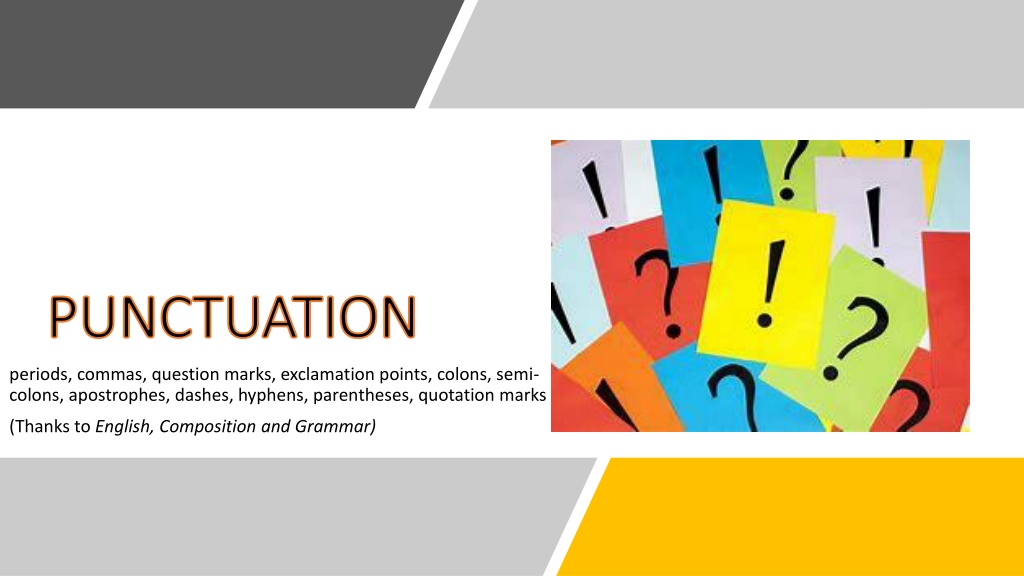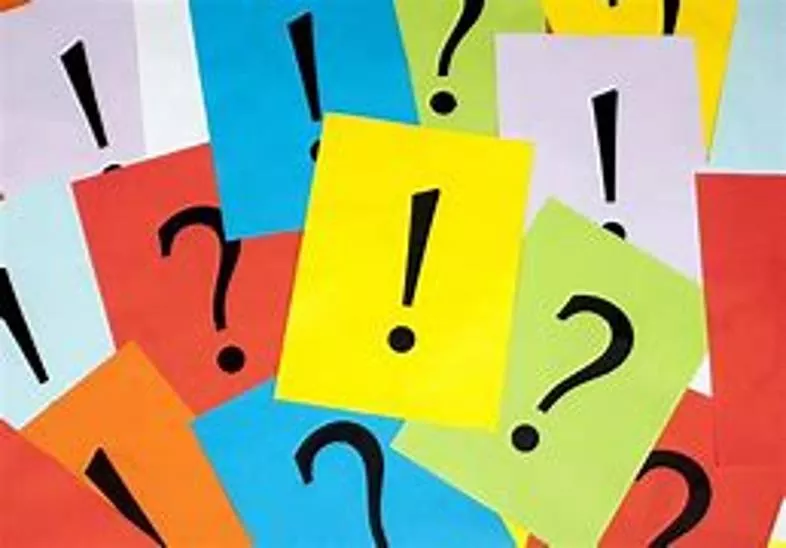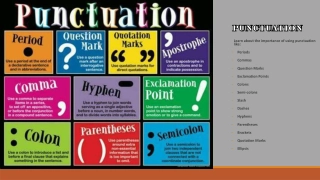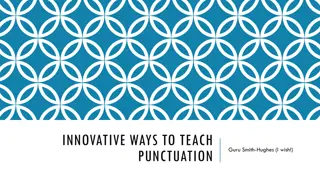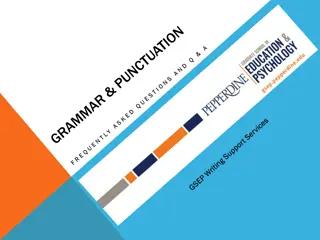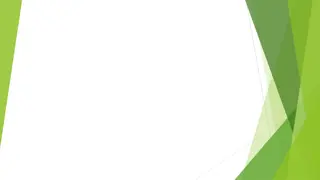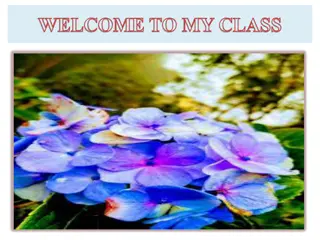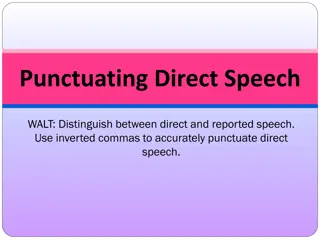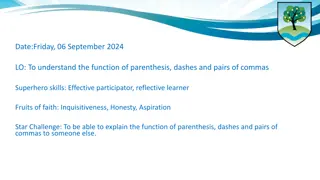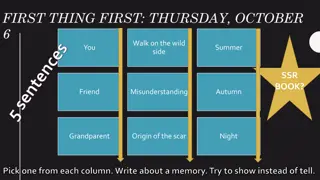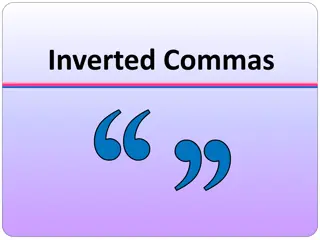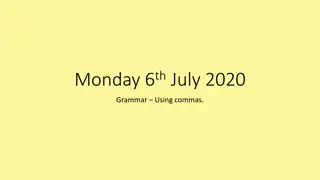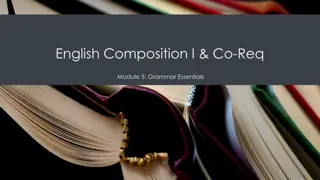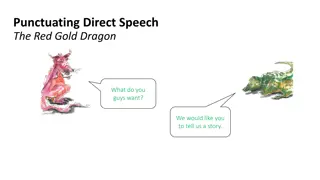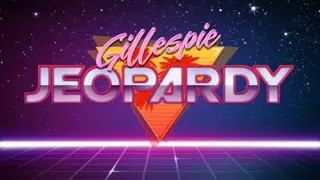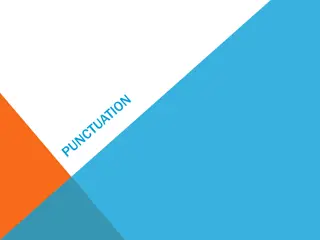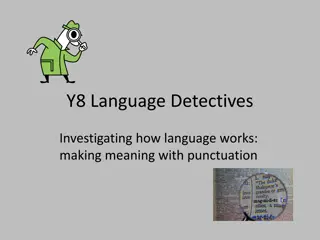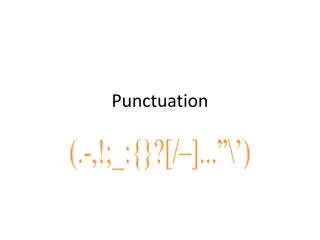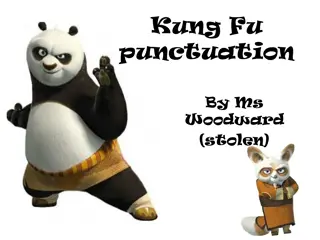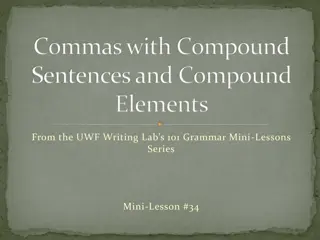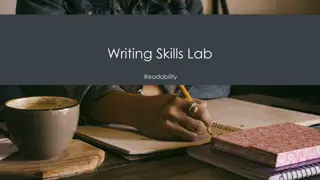Mastering Punctuation: The Art of Using Periods, Commas, and More
Explore the nuances of punctuation, from periods signaling the end of a statement to commas for separating elements in a series or setting off parenthetical expressions. Learn when to use punctuation correctly to enhance your writing clarity and style.
Download Presentation

Please find below an Image/Link to download the presentation.
The content on the website is provided AS IS for your information and personal use only. It may not be sold, licensed, or shared on other websites without obtaining consent from the author. Download presentation by click this link. If you encounter any issues during the download, it is possible that the publisher has removed the file from their server.
E N D
Presentation Transcript
PUNCTUATION PUNCTUATION periods, commas, question marks, exclamation points, colons, semi- colons, apostrophes, dashes, hyphens, parentheses, quotation marks (Thanks to English, Composition and Grammar)
Period Statement a definite or clear expression of something in speech or writing. A statement is followed by a period. Examples: 1. Please open the door. 2. By noon we had hiked four miles. 3. In Mexico a favorite meal is a corn tortilla. 4. When you have attended this school for a while, you will know your way around.
COMMAS When to use a comma: 1. Use a comma after introductory elements such as well, yes, wow, good grief, or no when they begin a sentence. No, I have not yet begun my paper. Good Grief, I thought you knew that. Well, I can see you tomorrow. 2. Use a comma after an introductory adverb clause. After we claim our first victory, we plan to celebrate at the Pizza Hut. If you enter the parking lot from the west, you will find several spaces. 3. Use a comma to set off expressions that interrupt. Marci, please close the door. Did you call me, Mother?
4. Use commas to set off parenthetical expressions. (A parenthetical expression is one that is used to extend the meaning of a word or phrase but is not one of the main parts of the sentence. The sentence makes sense without the parenthetical). You are, I hope, planning to attend the session. Dylan s new poems, in fact, are not inspiring. COMMAS
COMMAS 5. Use commas to separate words in a series. Note there must be three or more words/phrases in order to use commas. No comma I bought pens and pencils when I went to the store. Commas I went to the store because we needed pens, pencils, and paper. Commas The party I have been planning will celebrate our country s birthday, my sister Megan s graduation, and my parents wedding anniversary.
Commas, FANBOYS Use commas and a coordinating conjunction with a compound sentence. A compound sentence is two complete sentences connected by a coordinating conjunction. Coordinating conjunctions are also known as FANBOYS words. ,for I was eager to go, for I was prepared. ,and Buster wanted to go, and he is very prepared for the task. ,nor He didn t talk to his friends, nor did he call his wife. ,but I work on Friday, but I don t have to work on Saturday. ,or He must study hard for the exams, or he will fail. ,yet I ran very fast, yet I came in last. ,so My sister is very sweet, so everybody likes her.
UNNECESSARY COMMAS Please do not use unnecessary commas as this is confusing. Unless there is a rule calling for a comma, leave the comma out.
Some other punctuation marks
Punctuation, cont. Semicolon (;) This mark warns the reader to pause a little longer than for a comma, but not as long as a period. It could be called a soft period. 1. Use a comma between independent clauses--IF they are not joined by a FANBOYS word (for, and, nor, but, or, yet, so). Everyone in my family excels in baseball; I seem to the be the exception. 2. Use a semicolon between independent clauses joined by words like for example, for instance, otherwise, therefore, however. I am planning to go shopping tomorrow; however, I could wait if you want to go later. APOSTROPHE ( ) The apostrophe has several uses.
The apostrophe
DASH 1. A dash is used to indicate an abrupt break in thought. The party I m sorry I forgot to tell you was changed to next week. When Jimbo was born he was the last puppy we didn t think he would make it. 2. Use a dash to mean namely, that is, in other words, before an explanation. The weather was unseasonably warm eighty-degree temperatures which was a welcome change. (in other words, or that is).
HYPHEN Use a hyphen to divide a word at the end of a line. 1. Divide a word between its syllables. 2. Words containing double consonants should be divided between the double consonants.(cor-rect, begin-ing) 3. Words with a prefix or suffix should usually be divided between the prefix and root or the root and suffix. (pro-mote, peace-ful, tell-ing, depend- able) 4. Divide a word that is already hyphenated only at the hyphen.(self-defense, happy-go-lucky) 5. Divide a word so that at least two of its letters are carried to the next line. 6. Do NOT hyphenate a proper name of separate a title, initials, or first name from the surname.
Parentheses Use parentheses to enclose matter that is added to a sentence but is not considered of major importance. 1. The pyramids loomed before me (I had only seen pictures of them until now) and rose majestically against the purple sky. 2. My grandmother (she s very superstitious) avoids ladders and stays inside every Friday the thirteenth.
QUOTATION MARKS Quotation marks are used mainly to show the reader that someone s EXACT WORDS are being reproduced therefore, quotation marks come in pairs; one at the beginning of the quote, and one at the end. 1. Use quotation mares to enclose a direct quotation a person s exact words. However, do not use quotation marks for an indirect quotation. 2. A direct quotation begins with a capital letter. Briana asked, When do we get our assignments? 3. Other marks of punctuation, used with quotation marks, are placed according to these rules. A. Commas and periods are always placed INSIDE the closing quote marks. The concert tickets are sold out, Mary said, and I had hoped to go. B. Colons and semicolons are placed OUTSIDE the closing quotation marks. Ms. Johnson said, a stitch in time saves nice ; however, I ll admit I never really understood what that saying means.
The End This is not all there is to punctuation, but it will get you started.
